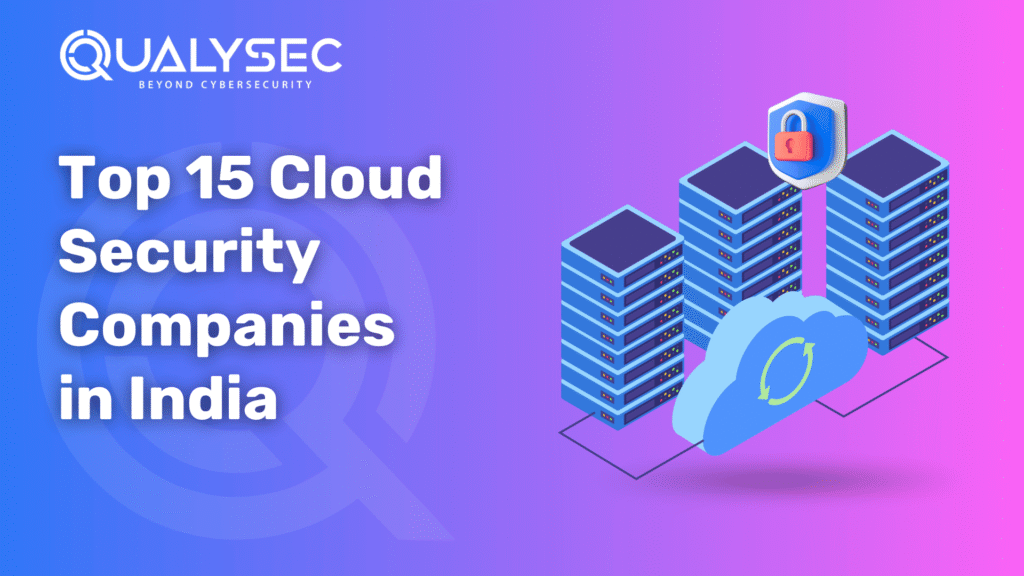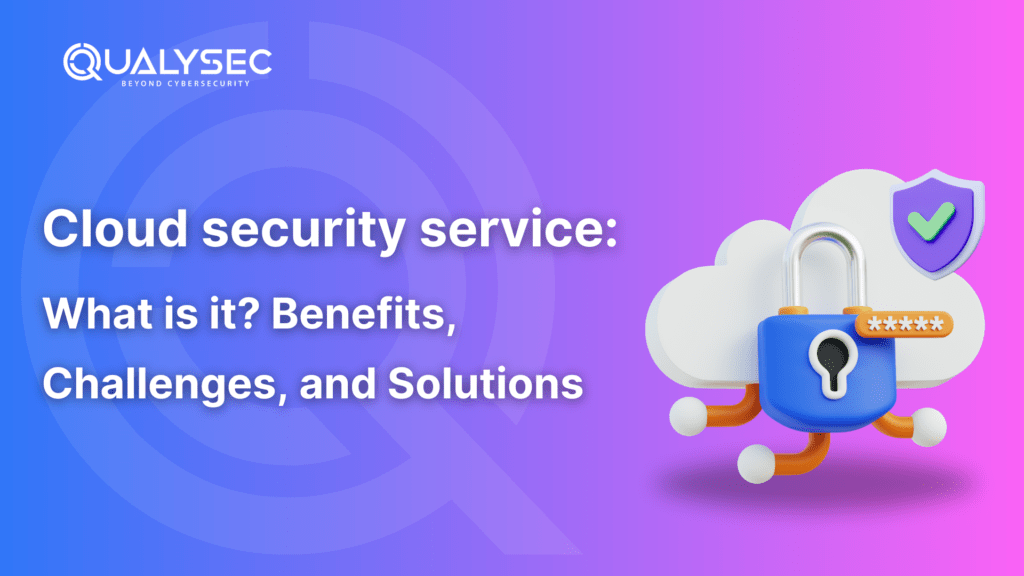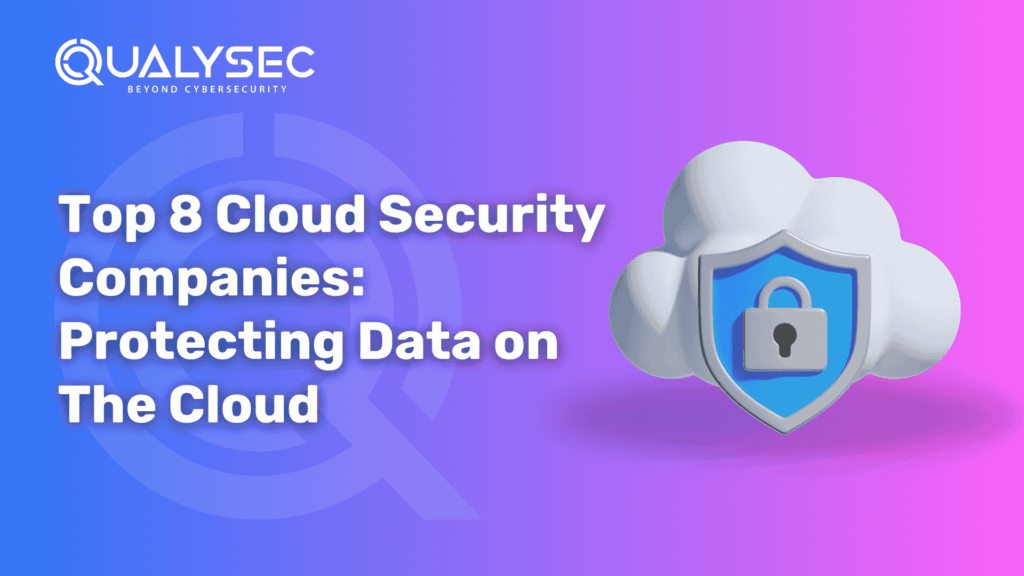Top 15 Cloud Security Companies in India
Cloud technology provides cost-effectiveness, growth, and versatility, but also brings emerging safety risks, such as security breaches, illegal utilization, noncompliance, and changing security threats. Studies show the necessity for sophisticated safety measures. 80% of businesses experienced the least cloud security issue in the previous 12 months. Companies need complete protection for the cloud to prevent these dangers. The importance of selecting the correct security supplier has increased due to the rise in bad threats and evolving compliance demands. To assist companies in making wise selections, this blog examines the top 15 cloud security companies in India, assessing their unique characteristics and essential safety measures. Things to Take Into Account While Selecting a Cloud Security Company List of Top 15 Cloud Security Companies in India 1. Qualysec – leading cloud security provider Qualysec, having an experienced group of qualified safety professionals and an in-depth knowledge of the cloud facilities, offers end-to-end safety measures for AWS, Azure, and GCP environments. It can be trusted by corporations, SaaS companies, and FinTech firms worldwide for web app safety, vulnerability mitigation, and regulatory adherence. Primary Security Services Companies must take a preventive approach to cloud security when security risks constantly change. Qualysec offers organisations worldwide unparalleled safety by fusing extensive industry knowledge, process-centred evaluation methods, and legal compliance assistance. To safeguard the cloud you are using right now, collaborate with Qualysec, one of the leading cloud security providers! Latest Penetration Testing Report Download 2. Microsoft Azure Security Microsoft Azure provides an elaborate safety system that combines regulatory compliance, enhanced security awareness, and integrated control. Azure’s security is interwoven throughout its activities, facilities, and actual servers, offering a comprehensive defence against changing threats. Additionally, Microsoft uses its extensive worldwide reach, which includes more than 3,500 cybersecurity specialists, to safeguard the business’s resources using Azure’s sophisticated risk identification and avoidance tools. 3. AWS Security Hub The cloud security company AWS Security Hub simplifies and organizes security management in all AWS environments. It features regular compliance checks, ongoing surveillance, and integration with several AWS offerings, including GuardDuty, The Examiner, and Macie. AWS Security Hub is intended to offer customers a single view of the safety of their private cloud. 4. Google Cloud Platform Google Cloud Platform (GCP) provides strong cloud security services to protect data from the cloud, apps, and architecture. Its complex security design, worldwide structures, and cutting-edge solutions powered by AI make information processing safe, adaptable, and quick. Using the same architecture that protects Google’s own services, GCP provides a full overview and the ability to identify threats, with safety incorporated at all cloud layers—the communication layer from connectivity to memory. 5. Trend Micro Trend Micro’s Trend Vision One™ technology provides cloud-based safety, protecting duties, apps, and information in multiple cloud and mixed settings. The system extends beyond traditional cloud safety by offering full accessibility and proactive threat detection and response features. It allows enterprises to successfully oversee threats while preserving regulation, while streamlining the whole safety control procedure. 6. Broadcom Through its Symantec Commercial Cloud system, Symantec, now a division of Broadcom, is a pioneer in cloud security services. It offers all-encompassing safety, tackling contemporary cybersecurity issues with systems, outcomes, cloud, and data safety technologies. Symantec offers a single method for risk mitigation, data security, and regulation, making it ideal for big businesses with intricate networks. 7. Cisco Cloud Security It provides a combined cloud-ready structure, backed by Cisco Security Cloud, to safeguard consumers, apps, and information in mixed and multiple cloud settings. Cisco wants to provide flexible, artificial intelligence-based security for contemporary businesses with products like Cisco Umbrella, Secure Endpoint, and Zero Trust. 8. CrowdStrike It is a leading supplier of cloud security options, primarily due to its Falcon Cloud Security architecture. Using machine learning and artificial intelligence to track and protect the data centre, CrowdStrike is renowned for its sophisticated risk assessment skills, providing its entire security from coding to the clouds. 9. Aqua Security Aqua Security continues to be an innovator in security for cloud-native platforms. To defend cloud-native apps, the business has extended its platform to incorporate modern capabilities, including updated regulatory rules and real-time determination of risks. Their services concentrate on safeguarding the complete program lifetime, from design to execution. Using capabilities like vulnerability analysis, execution security, and compliance verification, Aqua Security supports enterprises in guaranteeing the safety and authenticity of all their cloud-based applications security testing and information by handling the particular safety concerns of cloud-native settings. 10. LookOut Lookout has added complete cloud application security to its list of safety products. Fotosecure access cloud services on different gadgets means the company’s system now offers top threat detection and data loss mitigation tools. With an all-time high reliability percentage, its scanning capability is focused on detecting threats. These advancements demonstrate how the cloud computing security landscape is ever-changing, with every vendor working to improve their products to address fresh vulnerabilities. 11. McAfee Improved safety measures and improved loss of data control have boosted McAfee’s cloud safety platform. Its Cloud technology now helps businesses sustain solid safety positions by providing better oversight and management over digital-native apps. The company’s offerings include security information, online safety, and endpoint safety measures. 12. Intruder Motruder’s cloud-based vulnerability assessment system now provides more sophisticated threat detection features, including automatic screening and continuous surveillance, to assist companies in quickly identifying and fixing security vulnerabilities. The solution complies with SOC2 and ISO 27001 requirements and enables enterprises to address risks according to their intensity levels. 13. Orca Security Orca Security encountered difficulties in late 2024, including a 15% layoff due to the financial climate. Despite this, the business is still dedicated to offering agent-less cloud safety remedies, emphasizing control and comprehensive oversight throughout cloud-based settings. For businesses to maintain an excellent safety record in dynamic cloud environments, Orca Security’s methodology relies on continuous surveillance and the identification of threats. 14. IBM IBM keeps improving its cloud data security services by adding automatic regulation administration and artificial intelligence-driven threat assessment to its portfolio. Recently, they have concentrated on






